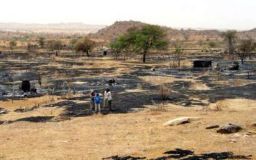Army attack against Darfur civilians was unprovoked – UN
Nov 24, 2006 (GENEVA) — An assault on the Darfur town of Sirba was apparently “a deliberate and unprovoked attack” by Sudanese government forces against innocent civilians, a United Nations human rights official said Friday.
 “Hundreds of armed men, many in military uniforms and some in civilian clothes, on horses, camels and in several trucks and Toyota Land Cruisers, attacked the civilian population,” said Praveen Randhawa, a spokeswoman for U.N. High Commissioner for Human Rights Louise Arbour.
“Hundreds of armed men, many in military uniforms and some in civilian clothes, on horses, camels and in several trucks and Toyota Land Cruisers, attacked the civilian population,” said Praveen Randhawa, a spokeswoman for U.N. High Commissioner for Human Rights Louise Arbour.
The African Union had said previously that the Nov. 11 attack, in which at least 30 people were killed and 40 wounded, was a raid on a refugee camp and neighboring villages by janjaweed militiamen. Randhawa said the attack resulted in 11 civilian deaths.
The military claimed 13 rebels were killed and that eight weapons were recovered, she said.
Randhawa said government officials in West Darfur confirmed that the military used force, but that it was in response to a rebel ambush on a military convoy.
“However, no evidence has been found to support this claim, and numerous witness accounts indicate that civilians and their homes and properties were the target of attack,” she told reporters at the U.N. in Geneva. “Contrary to the government’s claim, it appears that SAF (the Sudanese Armed Forces) launched a deliberate and unprovoked attack on civilians and their property in Sirba.”
Randhawa added that “extensive and wanton destruction and looting of civilian property” took place during the attack.
The government denied militia were involved, but witnesses described the attackers as members of the Sudan Armed Forces and the janjaweed, she said.
Sirba is located in north Darfur, close to the border with Chad.
Randhawa said the deaths include a teenage boy and a woman who were burnt to death in a house set afire by attackers. She said eight civilians, including a 3-year-old girl, were wounded by gunfire.
Her comments support what appears to be a new strategy by the U.N.’s Geneva-based human rights department to quickly report details of atrocities as they occur, perhaps in response to Khartoum’s expulsion last month of chief U.N. envoy Jan Pronk.
The envoy was ordered to leave the country after he said on his personal Web site that government forces had suffered defeats in Darfur and were deploying militia and troops to the western region in defiance of U.N. Security Council resolutions.
Earlier this month, Arbour’s office released a report that said hundreds of men identified by residents as janjaweed had killed about 50 civilians in attacks on western Darfur villages.
The government has always denied backing the janjaweed. But U.N. investigators have found that the government armed the janjaweed, and members of the militia have acknowledged receiving state support.
More than 200,000 people have been killed and 2.5 million others displaced since the conflict began in February 2003, when Darfur’s ethnic African tribesmen took up arms against what they saw as decades of neglect and discrimination by the Arab government in Khartoum.
A peace agreement signed by the government and one rebel group in May has been ignored, and the violence has escalated in recent months. The accord committed the government to disarming the janjaweed.
On Wednesday, U.N. humanitarian chief Jan Egeland said the “dramatic deterioration” of the situation in Darfur has left four million people in desperate need of humanitarian assistance.
Egeland, warning that the country could face a major humanitarian disaster within weeks unless there was a true cease-fire and a renewed effort to reach a lasting peace, said government forces, militias, rebel groups and an increasing number of opposition groups from neighboring Chad are roaming freely inside and outside refugee camps, spreading fear and terror.
U.N. Secretary-General Kofi Annan has called for a force of 7,000 soldiers and 3,000 police officers to help provide security in Darfur. The African Union currently has 7,000 peacekeepers in the region, which is the size of France.
Sudan’s President Omar al-Bashir has vehemently opposed the transfer of peacekeeping in Darfur from the AU to the United Nations. Annan said Wednesday he expected an answer from al-Bashir shortly on the details of an agreement reached last week in Addis Ababa, Ethiopia, that could open the door to the deployment of thousands of U.N. troops in Darfur as part of a combined U.N.-African Union force.
(AP)
